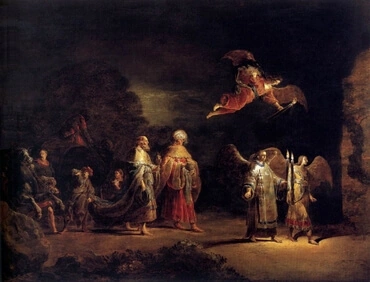4374. Verses 12-16 And he said, Let us travel on and go, and I will go beside you. And he said to him, My lord knows that the children are tender, and the flocks and herds with me are suckling, and if the men overdrive them for one day, all the flocks will die. Let my lord now pass over before his servant, and I will move on slowly at the walking-pace of the cattle 1 that are before me, and at the walking-pace 2 of the children, until I come to my lord, to Seir. And Esau said, Let me now place with you some of the people who are with me. And he said, Why so? Let me find favour in my lord's eyes. And Esau returned on that day on his own way, to Seir.
'He said, Let us travel on and go' means a further stage. 'And I will go beside you' means that they are to be joined together. 'And he said to him, My lord knows that the children are tender' means truths which have not yet acquired Divine life. 'And the flocks and herds with me are suckling' means goods, interior ones and natural ones, which have not yet acquired Divine life. 'And if the men overdrive them for one day, all the flocks will die' means a passage of time and a subsequent stage; also that otherwise they would not live, and so needed to be prepared to be joined together. 'Let my lord now pass over before his servant' means a more general presence. 'And I will move on slowly' means the subsequent state of preparation. 'At the walking-pace of the cattle that are before me' means as determined by the things that are general. 'And at the walking-pace of the children' means as determined by the truths situated within. 'Until I come to my lord, to Seir' means until they could be joined together, 'Seir' meaning the joining of spiritual things to celestial ones within the natural. 'And Esau said, Let me now place with you some of the people who are with me' means that some truths supplied by the truth of good might be joined. 'And he said, Why so? Let me find favour in my lord's eyes' means enlightenment received from their comparatively internal presence. 'And Esau returned on that day on his own way, to Seir' means the state at the time of Divine Natural Good to which the goods of truth had been linked, 'way' meaning, when compared with that Good, the good of truth.
Fußnoten:







